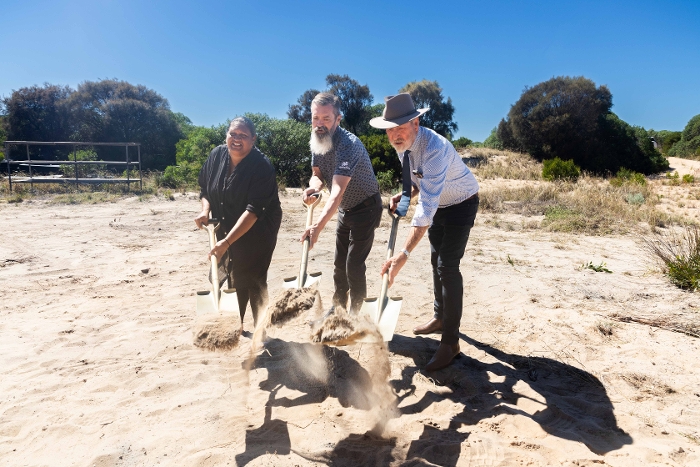

Shovel ready for CH4 Global’s first full-scale EcoPark on Eyre Peninsula

CH4 Global, Inc., has today begun construction on its first full-scale EcoPark, at Louth Bay on Eyre Peninsula, where it will grow and process enough Asparagopsis seaweed to supply up to 30,000 cattle per day in Australia and overseas.
Once completed later this year, the Louth Bay EcoPark will sustainably grow methane-reducing Asparagopsis at scale. Asparagopsis, which is a red seaweed native to South Australia, drastically reduces methane emissions from cows by up to 90 per cent.
The state-of-the-art EcoPark, 23km from Port Lincoln, will enable end-to-end production, with low impact, cost effective growing and processing of Asparagopsis seaweed along with the conversion into CH4 Global’s Methane Tamer - line of products to be fed to cattle and other ruminants.
The Louth Bay EcoPark will include a seedling hatchery, patented in-land growing approach for Asparagopsis, and harvesting and drying technology.
CH4 Global founder and Chief Executive Dr Steve Meller said the commercial facility would enable the scalable propagation of Asparagopsis to meet the needs of feedlots under contract, along with the increasing number of organisations contacting the company to change the feeding habits of their cows and to start bending the climate curve.
“CH4 Global has committed to eliminating one billion metric tons of carbon dioxide equivalent emissions and reach 150 million cattle by 2030 through our local and international partnerships with feedlots and farmers. The Louth Bay EcoPark is an essential step for us along that journey as we scale up our operations,” Dr Meller said.
Dr Meller said building the EcoPark at Louth Bay will be positive for the Eyre Peninsula economy, by creating ongoing jobs and supporting nearby communities.
“There will be economic benefits for Eyre Peninsula and for South Australia as a whole, and while that’s important, we’re also focusing on how we can bend the climate curve by supporting farmers around the world to reduce emissions through Asparagopsis.”
Following COP28's spotlight on agriculture's impact on climate change in late 2023, CH4 Global's new EcoPark will offer a crucial solution to targeting methane in livestock farming, with the state-of-the-art EcoPark enabling end-to-end production with low-impact, cost-effective growing and processing at scale.
CH4 Global has production facilities at Arno Bay, Lonsdale in Adelaide’s south, and in New Zealand. The company has also been working with First Nations communities across South Australia.
CH4 Global has implemented a sustainable design framework for Louth Bay and future EcoParks, guiding the use and management of energy and natural resources, waste and GHG emissions, and efficient use of eco-friendly materials.
CH4 Global has committed to preventing the creation of one gigatonne of CO2 emissions by 2030. To do so, CH4 Global needs to reach 150 million cattle —10 per cent of the world’s total.
Recent News
- Blog: Caitlyn's work experience at Hughes
- Blog: Navigating the changing media landscape
- $48M affordable housing hub revives beachside site
- Covid success story: SA digital transformation start-up expands interstate
- Industry leader Mark Smith appointed National Pharmacies CEO
- Mellor Olsson appoints new CEO
- Indonesia AirAsia touches down in Adelaide, enabling affordable connectivity across Asia via Bali
- Playgroup reimagined: Elders and children connect at ACS's Aboriginal aged care home
- Apartment living reaches new heights with $120 million Parkline development topping out
- A Fresh Take on Strawberries: Premium Packaging that Looks as Good as it Performs
- Paper & board packaging leader unboxes new global HQ in Adelaide
- Lutheran Homes Group brings its high-quality aged care to regional Victoria in historic expansion
- Blog: The growing AI threat - what it can mean for your brand and reputation
- CH4 Global named as one of the world’s top Sustainable Development Goal leaders
- Scotch AGS Vietnam’s inaugural SACE graduates go global
- Gen Z and the future of AI
- Qantas international services return to Adelaide
- Blog: Let’s get (a)political: all you need to know about elections and public relations
- The world’s most valuable dog toy revealed in the lead up to Guide Dogs Day
- Skytrax names Adelaide as best regional airport in Australia & Pacific region








